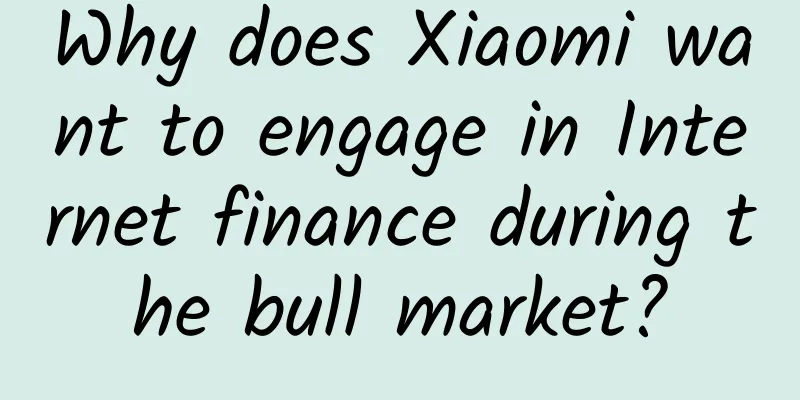Why does Xiaomi want to engage in Internet finance during the bull market?

|
Today, Xiaomi Finance officially launched its Internet financial product "Xiaomi Huoqibao", and E Fund's Tiantian Wealth Management Fund also became the first product to cooperate with Xiaomi Finance. According to Xiaomi co-founder Hong Feng, Xiaomi Finance plays a more intelligent platform role in the Internet finance industry, and is committed to building a platform and establishing a credit reporting system. On the one hand, it uses the data collected by Xiaomi smartphones to conduct credit reporting, and on the other hand, it builds a comprehensive financial service platform, combining Xiaomi's e-commerce attributes to provide financial services. In fact, Xiaomi has been involved in finance for a long time. On December 26, 2013, Xiaomi Payment Technology Co., Ltd. was registered and established by Beijing Xiaomi Technology Co., Ltd. with a capital of 50 million yuan. Lei Jun, CEO of Xiaomi, served as chairman and legal representative, and Hong Feng served as manager. In the field of Internet P2P, Xiaomi and Shunwei Fund have also invested in the Internet P2P platform JiMuBox. Now, with the launch of "Xiaomi Current Account", the clarion call for Xiaomi Finance to enter the Internet financial services industry has officially been sounded. 1. Xiaomi’s Shortcomings Traditionally, the financial industry emerged with commerce and the birth of human trade. In 2000 BC, the Babylonian temple already had institutions that managed the safekeeping of gold and silver, the collection and payment of interest, and the issuance of loans. Modern banks originated in medieval Italy. Due to Venice's special geographical location, it became a trade center at the time. The demand for transactions created the demand for currency custody and credit, and modern banks were born. In recent years, Alibaba has repeated the process that humans have gone through for thousands of years in China's Internet sector. First, there were Alibaba and Taobao, which led to transactions, and transactions led to the need for payment, which led to the creation of Alipay. Because of the time difference in transactions, Alipay had a fixed deposit balance, which was invested in money market funds to form Yu'ebao. Then Ant Financial, which covers most financial services, was established, and Alibaba rose to prominence. Xiaomi was originally a mobile phone manufacturer, but its model is mainly self-operated. Xiaomi's website sells Xiaomi mobile phones as an e-commerce platform, and the sales volume of just one Mi Fan Festival was 1.57 billion. However, when Mi Fans buy Xiaomi, they pay through Alipay and online banking, not Xiaomi's own payment channels. Xiaomi only has profits from hardware sales, and cannot go from sales to payment, and then to deposit funds and financial services like Alibaba. Lei Jun said in his 2015 New Year's message: "Xiaomi has evolved from a MIUI ROM developer and smartphone manufacturer to a national consumer electronics brand, a builder of the smart home ecosystem, and a mobile Internet content and service distribution platform. This is a company form that has never been seen in the global technology industry, and Xiaomi has come to the forefront of industry development." Since it is a service distribution platform, it would be a pity to miss out on the financial services which are the biggest piece of the pie. Xiaomi needs to make up for the missing shortcomings. 2. Reverse is also a good idea Alibaba started with Taobao, then Alipay, and then Yu'ebao, while Xiaomi started with "Xiaomi Huoqingbao", which is the exact opposite order of Alibaba. As a latecomer and a relatively weak e-commerce platform (Xiaomi Mall compared to Taobao and Tmall), Xiaomi has difficulty attracting consumers to set up accounts and deposit funds on its platform. So it did the opposite and first established "Xiaomi Current Account" to attract funds from Mi fans with an interest rate higher than bank deposits. We know that Ali's Yu'ebao can be used directly to buy things on Taobao, and I believe Xiaomi's Huoqibao will be no different. In this way, the funds that Mi fans deposit in Xiaomi Current Account for interest earning will become payment funds for Xiaomi Mall. In this way, Xiaomi can reversely establish the channel for commodity trading, payment methods, and financial value-added. Xiaomi has appointed Hong Feng, the manager of Xiaomi Payment, to be in charge of Xiaomi Finance, which speaks volumes. Hong Feng himself said that Xiaomi's user base can provide them with a lot of financial usage scenarios in various mobile phone usage scenarios, and with Xiaomi's e-commerce attributes, various consumption scenarios can fully incorporate financial services. Consumption requires payment and consumer credit, and the products sold by e-commerce can include money funds, stock funds, and financial products. The underlying purpose of launching "Xiaomi Current Account" is to use reverse means to open up the channel from consumption to financial services and improve Xiaomi's system. 3. The prospects are broad, but the timing needs to be discussed According to Lei Jun's "pig on the wind" theory, retail financial management itself is a vast market. Data shows that China Merchants Bank, which is currently the best performing bank in China, only has 35% of its total revenue coming from retail business, while similar banks in the United States have a much higher proportion of personal retail business revenue than China Merchants Bank, so the prospects for retail financial business are broad. Judging from Hong Feng's speech, Xiaomi Financial Services must first become a financial department store at this stage, using the big data in Xiaomi's hands to help users select financial products and provide financial services; at the same time, Xiaomi can also obtain location information, user behavior information, and consumption information from mobile phones based on MIUI's own 100 million users and multiple products in the Xiaomi ecosystem. This lays the foundation for credit investigation and explores the way for future consumer loans and micro loans. This is almost a replica of Ant Financial, a subsidiary of Alibaba. Unlike Alibaba, Xiaomi has hardware and ROM access. If it develops, its system will be more complete than Alibaba. Xiaomi Finance has a good long-term prospect, and Lei Jun has the momentum to become the next Jack Ma. However, Xiaomi Finance was launched in May 2015, which was not a good time. China's stock market is currently in a crazy bull market, and all kinds of funds are rushing into the stock market. The money market funds with low profits are already in a low ebb. It is doubtful how much funds Xiaomi can gather by launching "Xiaomi Current Account" at this time. If funds cannot be gathered, there will be no subsequent effects. The timing of Xiaomi's launch of "Xiaomi Current Account" is questionable. Xiaomi has been planning to develop Internet finance for a long time, but due to its weak position, it is difficult to build a system like Alibaba. "Xiaomi Current Account" starts with financial services and reversely builds a financial service system. This is the purpose of Xiaomi's involvement in Internet finance. In 2015, this move will not have much effect due to the diversion of funds caused by the booming stock market, but in the next few years, Xiaomi Finance has the opportunity to grow into a giant like Ant Financial, a subsidiary of Alibaba. As a winner of Toutiao's Qingyun Plan and Baijiahao's Bai+ Plan, the 2019 Baidu Digital Author of the Year, the Baijiahao's Most Popular Author in the Technology Field, the 2019 Sogou Technology and Culture Author, and the 2021 Baijiahao Quarterly Influential Creator, he has won many awards, including the 2013 Sohu Best Industry Media Person, the 2015 China New Media Entrepreneurship Competition Beijing Third Place, the 2015 Guangmang Experience Award, the 2015 China New Media Entrepreneurship Competition Finals Third Place, and the 2018 Baidu Dynamic Annual Powerful Celebrity. |
<<: Why are more and more mobile phones giving up memory card slots?
Recommend
5 years of practical experience in self-media, sharing the secret of earning millions a year: the discount is only for these 2 days!
Hello everyone, I’m Guangsen. In the recent round...
As a product grows from 0 to 100, what is operations doing?
When I was in college, I started to get involved ...
Which copywriter is the best at leveraging the Labor Day campaign?
It’s not Labor Day yet. The chat mode of " w...
Li Songwei's 21-day training camp makes changes happen steadily and continuously
Li Songwei's 21-day training camp allows chan...
Zhihu product disassembly and analysis!
"I'm in the United States, just got off ...
What you are eating may be a "child of the stars"! Enter the world of irradiated food
What you are eating may be a "child of the s...
The fourth session of the Aiti Tribe Technical Clinic
【51CTO.com original article】 [51CTO original arti...
Why does he have invincible immunity? Scientists have made new research discoveries!
Bats are amazing creatures. Not only are they the...
Are couriers switching jobs to deliver takeout? Reporter survey: Job-hopping is not common
The poor management of the Yuantong Express Huayu...
How much does it cost to develop a community convenience service mini program and a community group buying mini program?
With the continuous development of mobile Interne...
Spreading faster! Beware of the "second-generation variant" of Omicron, cases have appeared in many countries
Recently, a new variant of the Omicron virus, num...
Data analysis of Internet finance platforms: These three models are enough
Since the operations department is the department...
Zhang Hailiang joins the electric star Jia Yueting's LeTV car ecosystem shrinks across the board
The news that LeEco Auto CEO Zhang Hailiang offic...
Take the initiative in your career: build your personal brand and let opportunities come to you
Course Catalog: 01 Make sure what you earn is wor...
Osteoarthritis is not just a problem for the elderly, these groups of people should also be careful!
Osteoarthritis: a growing global disease burden O...









